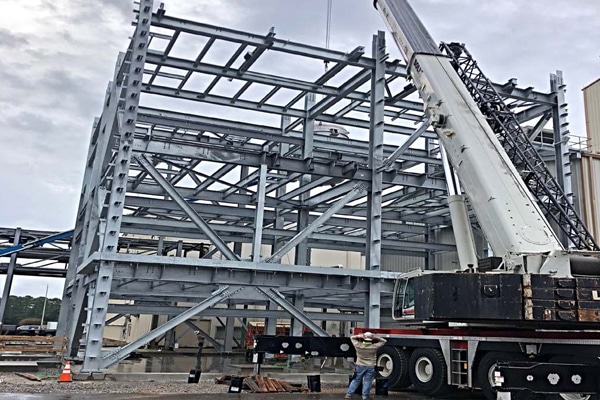The Ultimate Manual on Custom Steel Construction Solutions for Structural Projects
In the world of structural tasks, the significance of custom-made steel manufacture solutions can not be overemphasized. From the foundational understanding of steel manufacture fundamentals to the complex procedure of selecting the most ideal materials, every step in this trip plays an essential function in the utmost success of a task. As we navigate through the intricacies of layout factors to consider, fabrication procedures, and quality assurance actions, a detailed handbook serves as a leading light for experts seeking excellence in steel fabrication options. Remain tuned to reveal the understandings that can change the way structural tasks are approached and executed.
Recognizing Personalized Steel Construction Basics
Looking into the basics of custom-made steel manufacture offers insight right into the detailed procedure of transforming raw steel into tailored structural parts. Custom-made steel manufacture is a specialized production technique that entails cutting, shaping, and putting together steel products to create special frameworks according to certain job requirements. Recognizing the fundamentals of custom steel construction is critical for ensuring the effective implementation of architectural jobs.
The procedure typically starts with the evaluation of project specifications and layout demands. This first stage includes thorough preparation and cooperation in between makers, engineers, and developers to establish one of the most ideal approach for producing the steel elements. Precision is crucial during the fabrication procedure, as also small inconsistencies can influence the structural honesty of the final product.
Numerous methods, such as cutting, welding, and shaping, are employed to transform raw steel right into the desired architectural components. Experienced fabricators use sophisticated machinery and tools to guarantee precision and consistency throughout the construction procedure. Quality control steps are carried out to verify the integrity of the made elements prior to they are set up on-site, guaranteeing conformity with market requirements and job requirements.
Selecting the Right Steel Materials

First and foremost, the kind of architectural job and its certain needs play a crucial function in establishing one of the most suitable steel products. Factors such as the load-bearing capacity, environmental conditions, and desired lifespan of the framework will determine the quality and kind of steel that should be used.
In addition, the physical buildings of the steel, including strength, weldability, and ductility, have to straighten with the task's demands to guarantee optimum efficiency and sturdiness (metal fabrication melbourne). Additionally, factors to consider such as deterioration resistance, cost-effectiveness, and schedule of the steel materials need to likewise be considered during the selection procedure
Style Considerations for Structural Tasks
Architectural jobs necessitate precise interest to create considerations to ensure both capability and safety are prioritized throughout the construction process. When it comes to developing architectural tasks, numerous essential see post aspects need to be taken into account to assure the success of the venture. By carefully thinking about these elements throughout the design phase, designers and engineers can guarantee the structural task's success from perception to completion.
Enhancing Fabrication Procedures for Efficiency

Furthermore, carrying out lean production concepts can significantly improve efficiency in steel fabrication. By reducing waste, enhancing process, and improving communication between different teams included in the construction process, projects can be completed a lot more quickly and with better standards.
In addition, developing an efficient manufacturing timetable and process can assist in prioritizing jobs, appointing resources successfully, and meeting project target dates immediately. By having a clear plan in position and routinely monitoring development, any potential traffic jams or delays can be recognized and attended to quickly, ensuring smooth and reliable fabrication procedures for structural jobs.
Quality Assurance and Project Administration in Steel Fabrication
To guarantee the effective execution of steel manufacture jobs, precise quality assurance steps and effective project monitoring techniques are crucial parts in preserving precision and meeting customer assumptions. Quality control in steel fabrication entails strenuous assessments at different stages of the manufacture procedure to verify conformity with job specs and industry criteria. This includes material screening, dimensional checks, and weld assessments to guarantee architectural stability and safety.
Task administration plays an essential role in working with the various facets of steel construction projects, such as organizing, resource appropriation, and communication amongst team participants. A well-defined task plan with clear purposes, turning points, and timelines helps to keep an eye on progress and resolve any possible issues proactively. Reliable communication in between all stakeholders, including clients, producers, engineers, my response and contractors, is crucial for making certain that the project advances efficiently and meets the preferred top quality criteria.
Conclusion
Finally, custom-made steel fabrication plays a vital duty in structural projects by supplying customized remedies using the best materials and style factors to consider. Performance in fabrication processes, quality control, and efficient job monitoring are crucial for successful outcomes. By understanding the fundamentals of custom-made steel manufacture and executing structured procedures, task groups can supply durable and top quality structures that meet the particular needs of their clients.
Custom steel fabrication is a specialized production strategy that includes cutting, shaping, and setting up steel materials to produce distinct structures according to specific task needs.To make sure the successful useful source execution of steel manufacture tasks, careful high quality control steps and effective task administration methods are important components in keeping precision and meeting customer assumptions. Quality control in steel fabrication entails strenuous evaluations at various phases of the construction process to validate compliance with project specs and industry criteria (Alpha reo).Task administration plays a crucial duty in collaborating the numerous elements of steel fabrication jobs, such as scheduling, source allocation, and interaction among group participants.In final thought, custom steel construction plays an essential duty in structural jobs by providing tailored remedies utilizing the appropriate materials and style factors to consider